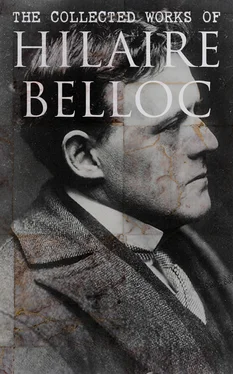Whether he had already decided on that Thursday to make a stand we cannot tell, but it is not probable, because he had as yet no knowledge of the positions beyond the forest, and of the chance the ground would afford him of meeting an attack. One thing he already knew, which was that his retreat was secure. The pace of the French pursuit might compel him to a decision on Saturday at earliest, but, short of complete disaster, he had a road open behind him across the Authie by the passage of Ponches and along the great Roman way which led from Picardy to the Straits of Dover.
What he did was this. He sent the bulk of the army round by the main road whose terminals are Abbeville and Hesdin, and which skirts the forest. His own household he accompanied through the wood, presumably with the object of keeping in touch with the foraging parties who would during that Friday be coming up along the southern edge of the woods to follow the main force along the high road. A further advantage of so moving through the wood himself was that he could thus lie upon the flank of his force and let it march round him until it got in front of him in the open country by Crécy. Then he could join it, coming up in its rear, that is, upon the side from which attack was expected, gather his information, study the positions, learn the approach of the French advance, and in general organise the coming action, if an action should prove necessary. Edward camped, therefore, in the forest upon that Friday night, and upon the further side of it, just above Crécy town; while the whole of his main body was marching up to the right or east of him by the high road that skirts the woods. That main force, joined by the foraging parties which had gone further westward on the day before, easily covered the few miles, and camped on the evening of the Friday upon the ridge which runs in a level line eastward and northward from just above the town of Crécy to the village of Wadicourt, for somewhat over a mile. Leaving his tents and domestics upon the edge of the wood, he spent the last hours of that day establishing his forces along the ridge for the night, for it was there that he had now determined to await the French army and to bring it to action.
The advantage of that position which upon emerging from the forest Edward had immediately seized, will be dealt with in the ensuing section; meanwhile we must return to inquire what was happening to the French pursuit.
We must not consider the French army as one united body. Had it been that, it would not have been defeated, and, what is more, the particular place of Crécy in military history, and its lesson of the contrast between the older feudal and the newer regular levies, would never have been taken; for Crécy, as we shall see, was largely a victory of things then new over things then old. No records give us precisely the positions, number, or routes of the King of France and his allies, but we know the following points, from which we can construct a general picture.
First: The commands were various and disunited. That personal system which had arisen five hundred years before, and more, when the old Roman tradition of the Frankish monarchy gradually transformed itself into a series of summonses to lords who should bring their vassals, was still the method by which a French host was tardily and irregularly summoned. For general and lengthy expeditions it was sufficient. For the prosecution of the innumerable local conflicts of the Middle Ages it was actually necessary. Upon occasion at long distances from home, and after long companionship in the field, if there were also present a very leading character among the feudal superiors, and especially if that character were clothed with titular rank, it could achieve something like unity of command. But Philip’s army, the last contingents of which were still in act of joining him, enjoyed no such advantages. At least five separate great bodies, four of which were largely subdivided, were loosely aggregated over miles of country, gathering as they went chance reinforcements, and losing by chance defections.
Secondly: A certain proportion of regular paid men, including the foreign mercenaries, accompanied the King of France. These were in part with the King himself, in part detached to watch the passages of the river.
Thirdly: The King, with a considerable personal force, and with some of his mercenaries as well, was up in the neighbourhood of Saigneville upon the noon and early afternoon of the Thursday. He retraced his steps towards Abbeville, and recrossed the river there himself either upon the Thursday evening, or more probably upon the Friday.
Fourthly: Round about Abbeville the bulk of the incongruous force was gathered when the King reached it, and very considerable bodies lay in the suburbs to the north of the town.
Finally, we know that on the Saturday morning the King heard Mass and took Communion at the Church of St. Stephen (now demolished).
From all this we can construct a fairly accurate view of the French advance, especially when we consider where the French forces lay when they reached the field. From Abbeville to the field of Crécy is, as the crow flies, ten miles. A great main road (along the further part of which the English had marched on the Friday) led to the neighbourhood of the field and past it: the main road which goes from Abbeville to Hesdin. By this road, breaking up probably rather late upon the Saturday morning, the largest of the loosely gathered French contingents marched. Far to the right of them over the countryside would be advancing the other feudal levies under the King of Bohemia and John of Luxembourg, the exiled Count of Flanders, the ex-King of Majorca, and other friends, connections, and vassals whom Philip had summoned with their arrays. It is to be presumed that certain bodies on the extreme right went up by the Roman road which misses Abbeville coming from the south, and makes for Ponches, bounding the battlefield of Crécy on its extreme eastern side.
Following this chaotic advance of the dispersed host, gathered in a jumble, the wholly untrained peasant levies which had been swept up from the villages on the advance proceeded in disorder. And it was thus without regular formation, save among the Genoese mercenaries (some 15,000 in number at the outset of the campaign, though we do not know of what strength on the field itself), that the first lines of mounted men caught sight from the heights of Noyelles 14and Domvast of the English line on the ridge of Crécy three miles away.
It was early in the afternoon before that sight was seen. The wind was from the sea, and gathering clouds promising a storm were coming up before it, and hiding the sun.
Before these advance lines of the French army, and between it and Edward’s command, the ground fell gradually away in low, very gentle slopes of open field towards the shallow depression above which a somewhat steeper and shorter bank defended the line, a mile and a half long, upon which Edward had stretched his men.
There was an attempt at some sort of deployment, and the first of three main commands or “battles” were more or less formed under Alençon, the French King’s brother. Immediately before it were deployed the trained mercenaries, including the Italian cross-bowmen under their own leaders, Dorio and Grimaldi. Behind was a confused mass of arriving horse and foot, the King himself to the rear of it, and much of it German and Flemish separate commands. We do not know their composition at all. Still further to the rear, and stretched out for miles to the south, straggling up from Abbeville, came, that late afternoon, the rest of the ill-ordered host at random. Before the action was begun, the whole sky was darkened by the approaching storm, and violent pelting rain fell upon either host. The clouds passed, the sky cleared again, but it was nearly five o’clock before the first attack was ordered.
Читать дальше












